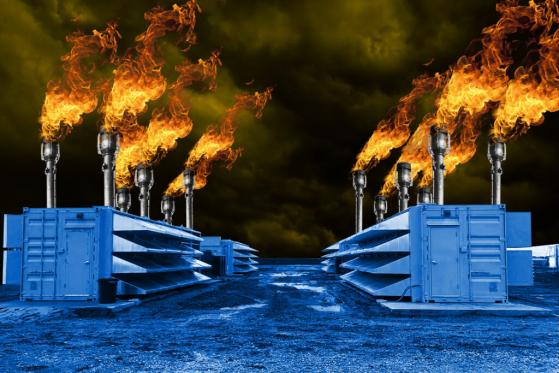For more than a year now, cryptocurrencies that rely on a proof of work (PoW) consensus model to validate transactions have been blasted by media outlets for their negative impact on the environment. That’s because crypto mining operations use a lot of electricity to run the heavy-duty servers and cooling units necessary to solve the complex codes fast and first to confirm blockchain transactions, thereby earning crypto as reward for their efforts and investment.
Many climate change watchers assert that all that energy production and use from cryptocurrencies such as Bitcoin, Dogecoin, and Ethererum creates a carbon foot that’s stepping on the environment and crypto’s reputation.
However, a Bloomberg article on Thursday reported that U.S.-based energy company ExxonMobil (NYSE:XOM) has been running a pilot project since January 2021 using excess natural gas it produces — and can’t ship — as a source to generate electricity for Bitcoin miners. The article further states that ExxonMobil has signed a deal with Crusoe Energy to use the extra natural gas from oil wells in North Dakota to power crypto PoW ops. This beta test crypto project uses 18 million cubic feet of natural gas per month. That amounts to less than half a percent of Exxon’s daily production volume in that state.
From ExxonMobil’s perspective, transporting natural gas requires enough pipelines to safely accommodate the total amount of the supply they capture. The problem is, there aren’t enough transport pipelines and this shortage forces energy producers to burn off — or “flare” — the excess gas or vent it directly into the air. That waste hurts both the environment and the producer’s profits.
From the perspective of the crypto miners, the electricity generated from natural gas produces about half the greenhouse gas emissions that it takes to produce the same amount of electric power using coal.
Gas and oil companies are increasingly under pressure from investors, regulators, and eco-friendly advocates to shrink their carbon footprint to lower negative climate effects. Reducing flared gas waste is a step in that direction. While the fuel is still burned as part of this crypto project, it replaces the usual fuel that the crypto-mining operation would have used otherwise.
According to the report, this project could be expanded to Alaska, as well as outside the U.S. in Germany, Guyana, Argentina, and Nigeria.
EMAIL NEWSLETTER
Join to get the flipside of crypto
Upgrade your inbox and get our DailyCoin editors’ picks 1x a week delivered straight to your inbox.
[contact-form-7] You can always unsubscribe with just 1 click.
